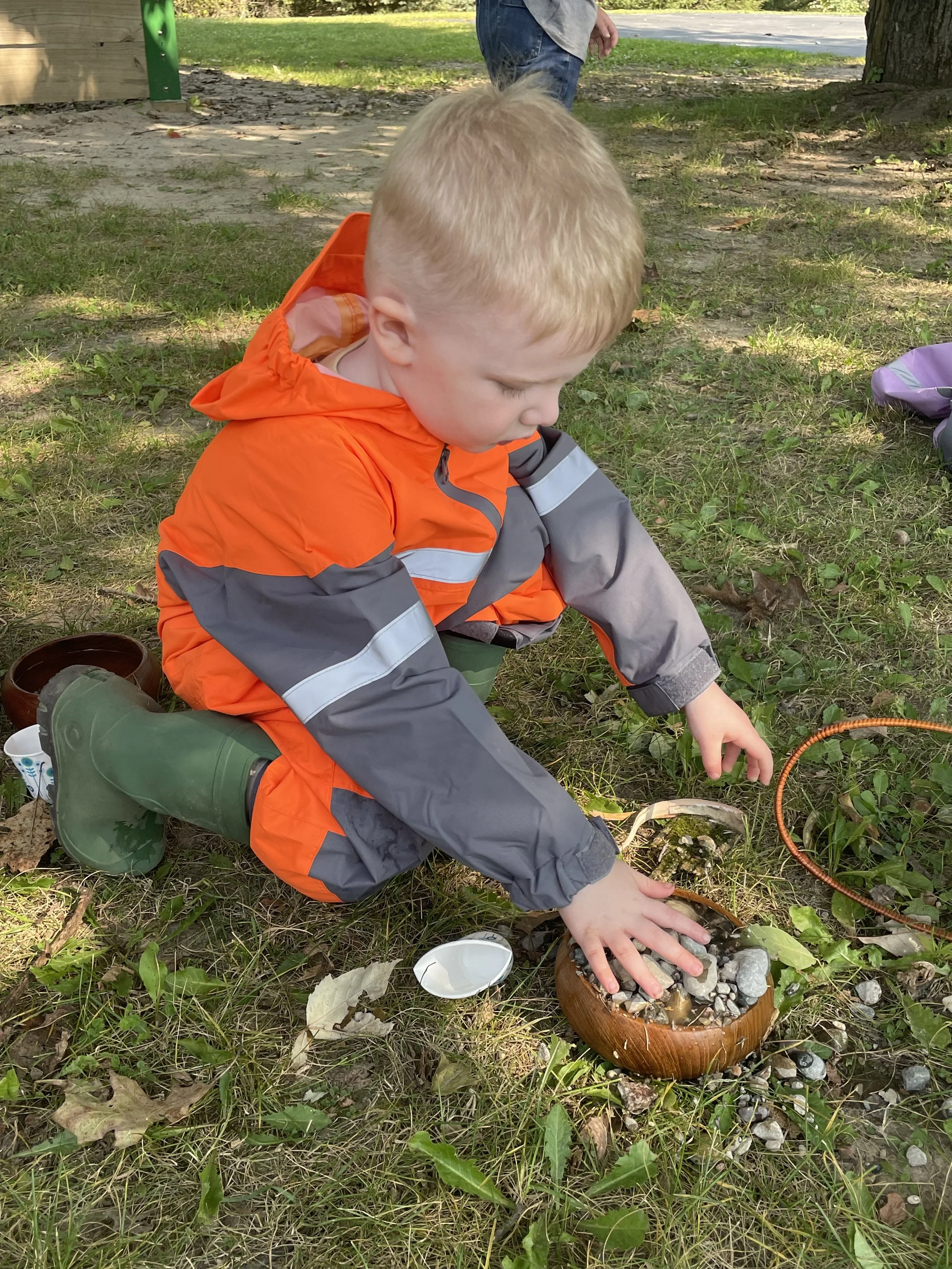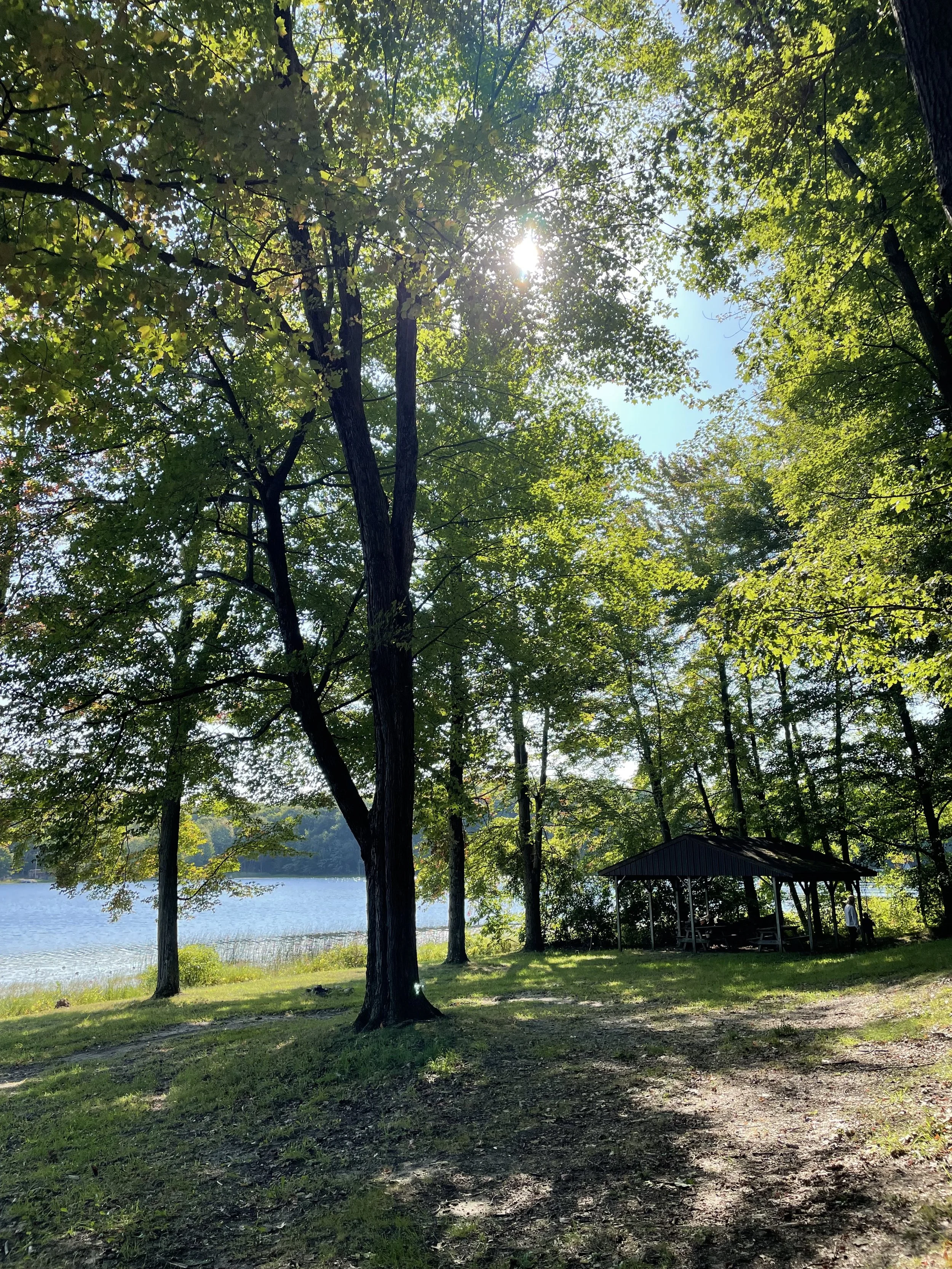A Pinewood Trails Early Learner making nature soup.
Our Mission
At Pinewood Trails our Directors and Forest School Educators are dedicated to working alongside families and their children to foster resilience, build relationships, enhance a connection to the natural world around us, and nurture social, emotional, physical, and stewardship growth.
One of the many outdoor classroom spaces at Camp Lael. Pinewood Trails Forest School visits different sites in camp throughout the week to enhance learning opportunities!
“Each year more parents, caretakers and educators are heading out of the schoolhouse and into the woods as they begin to see the value of developing non-cognitive skills and children's social and emotional growth over rigorous testing and traditional academics.”
Forest School Foundation, located in Ashville, North Carolina
History Of Forest SChool
Forest School traces its roots back to mid-twentieth century Denmark, Sweden, and Germany.
In 1950, Ella Flautau observed her children and their friends playing in a forest for long periods each day. This informal daycare received great interest from the community and led to the formation of Forest Schools.
Around the same time, ex-military man Goesta Frohm created Skogsmule in Sweden. Frohm used four fictional characters to teach about nature through play and imagination.
In Germany, Forest Kindergarten, also known as Waldkindergarten, grew in popularity during the 1960s and became recognized as state-funded schools in 1993. Today, they continue to flourish.
The founders in each country shared the same goal: to immerse children in nature and to encourage them to play, explore, take risks and learn about the world around them.
Although, Forest School and it’s culture is a newer practice in the United States (the first modern-day Forest School opening in California in 1996) we know from decades-long educational and child-psychology research the lasting benefits connecting children to nature has at a holistic level.
6 Principles of Forest School
When choosing a nature-based program, it can be hard to tell if it’s a TRUE forest school. At Pinewood Trails we align with the national professional standard’s 6 principles.
Click on each principle below to explore how at Pinewood Trails Forest School we execute the principles in our practice.
-
The Long Term Principle: Forest School takes place regularly, with the same group of learners, over an extended period of time, encompassing 2 more seasons.
Pinewood Trail Forest School holds regular monthly sessions, 2-4 days per week, four hours a day, over the span of 30 weeks, covering two seasons.
-
The Nature Principle: Forest school takes place in a woodland or natural wooded environment to support the development of a relationship between the learner and the natural world.
Pinewood Trails Forest School maintains a Forest Family Handbook that communicates how we operate in a way that minimizes the impact of Forest School on the planet, its ecosystems, its people, its plants, and its animals. We also include daily opportunities for the use of natural materials.
-
The Risk Principle: Forest school offers learners the opportunity to take supported risks appropriate to the environment and to themselves.
Pinewood Trail Forest School has high ratios of adults to children to enable supported risk taking. Our Forest School maintains records, policies, and procedures that allow our educators to be confident in offering supported risk-taking opportunities.
The paperwork includes:
A site risk assessment
Daily risk assessment
A stated approach to dynamic risk-assessment
A clear Health and Safety policy that includes the risk-benefit approach taken in Forest School.
Emergency plans for a variety of scenarios.
-
The Holistic Learning Principle: Forest School aims to promote the holistic development of all those involved, fostering resilient, confident, independent, and creative learners.
Pinewood Trail Forest School recognizes that behavior is communication. We maintain our Forest Family Handbook to set out how we approach behaviors that may be challenging.
Our educators plan sessions that offer mixed opportunities for explorers to develop their physical, social, cognitive, linguistic, emotional, and spiritual selves while taking risks for their emotional, social, and physical well-being.
-
The Leadership Principle: Forest School is run by qualified practitioners who continuously maintain and develop their professional practice.
Pinewood Trails is led by two qualified forest school practitioners who hold a Director certification. All educators and staff are required to hold an up-to-date first aid/CPR certification, nationwide fingerprint clearance, and negative TB test.
-
The Community Principle: Forest School uses a learner-centered lens to create a community for development and learning.
At Pinewood Trails Forest School educators make observations during each session to identify the needs and motivations of explorers, these observations help to inspire choice and free-play.
Our Parent Handbook outlines our Forest School’s ethos and principles. How we safeguard all member of the forest school community, and how instances of bullying are dealt with.
Principles and criteria for good practice cited from The Forest School Association- www.forestschoolassociation.org


